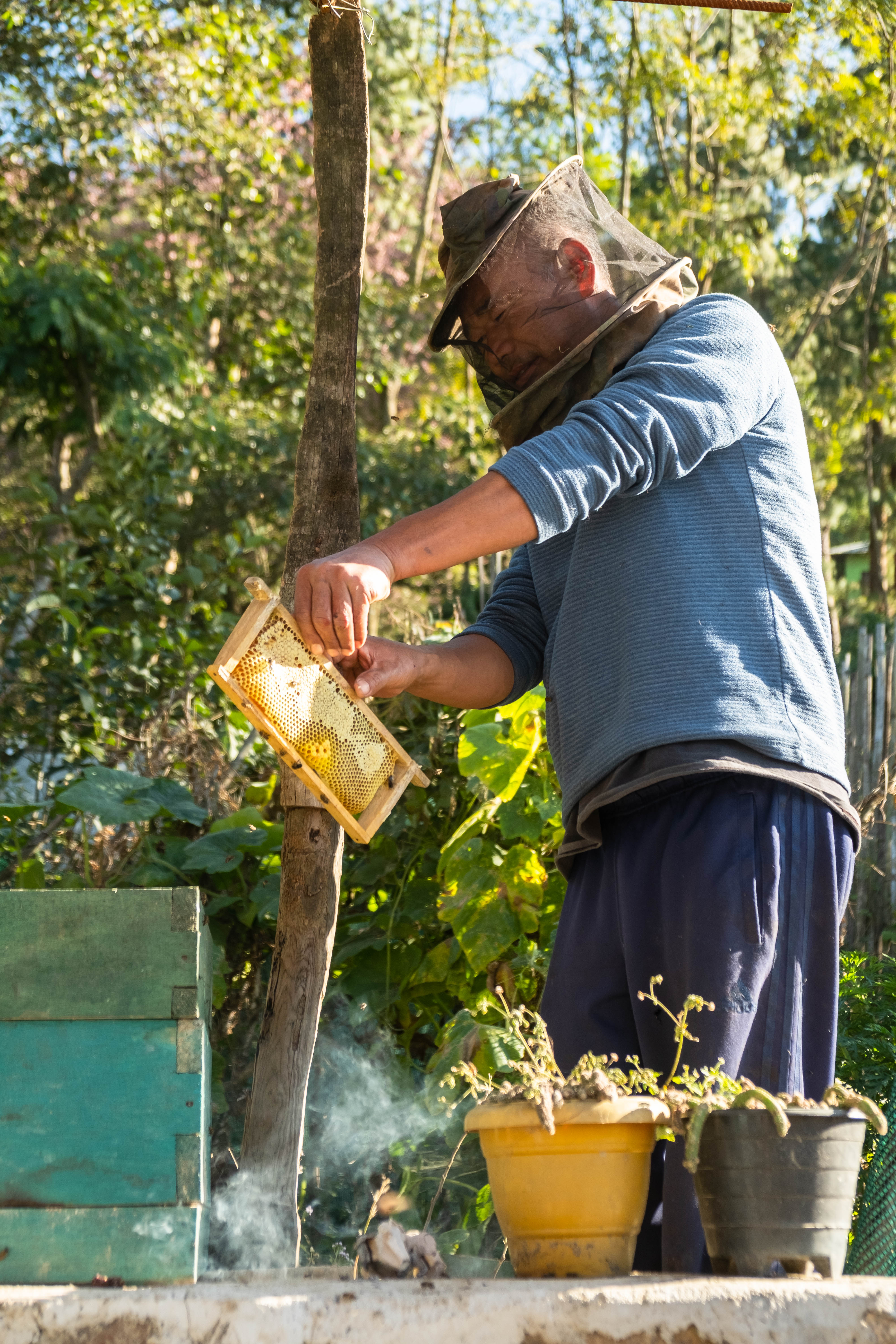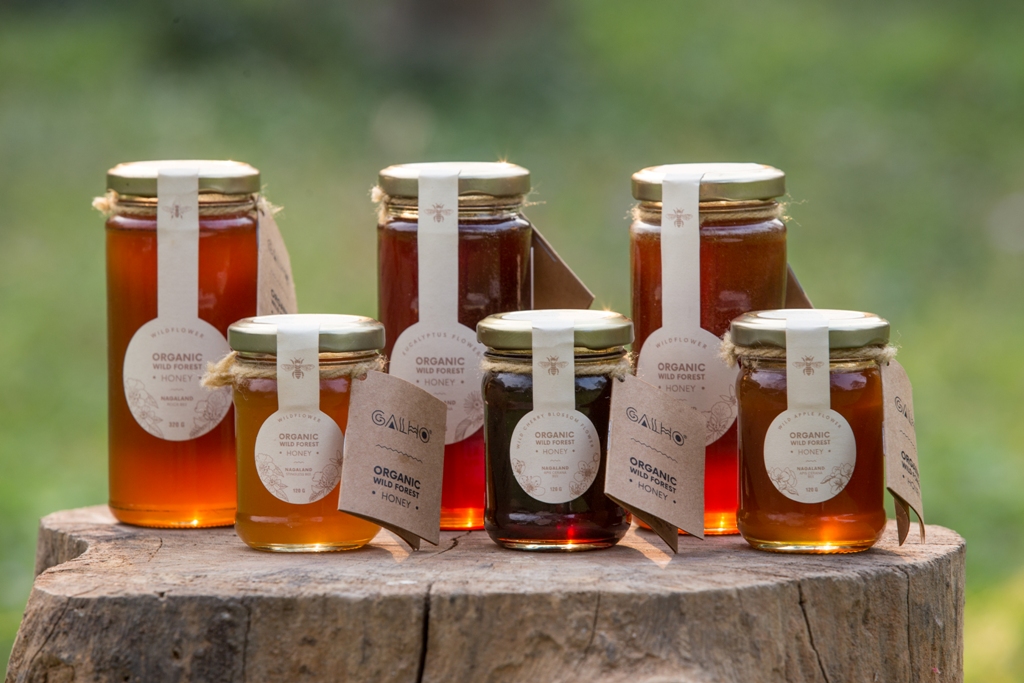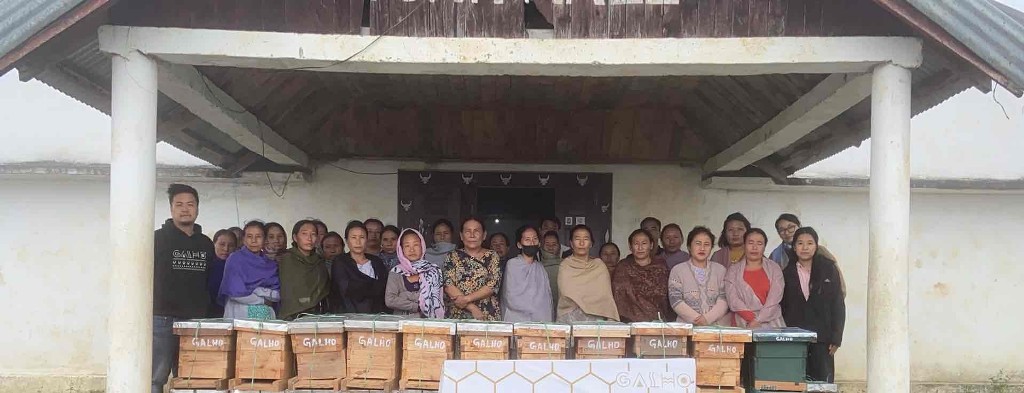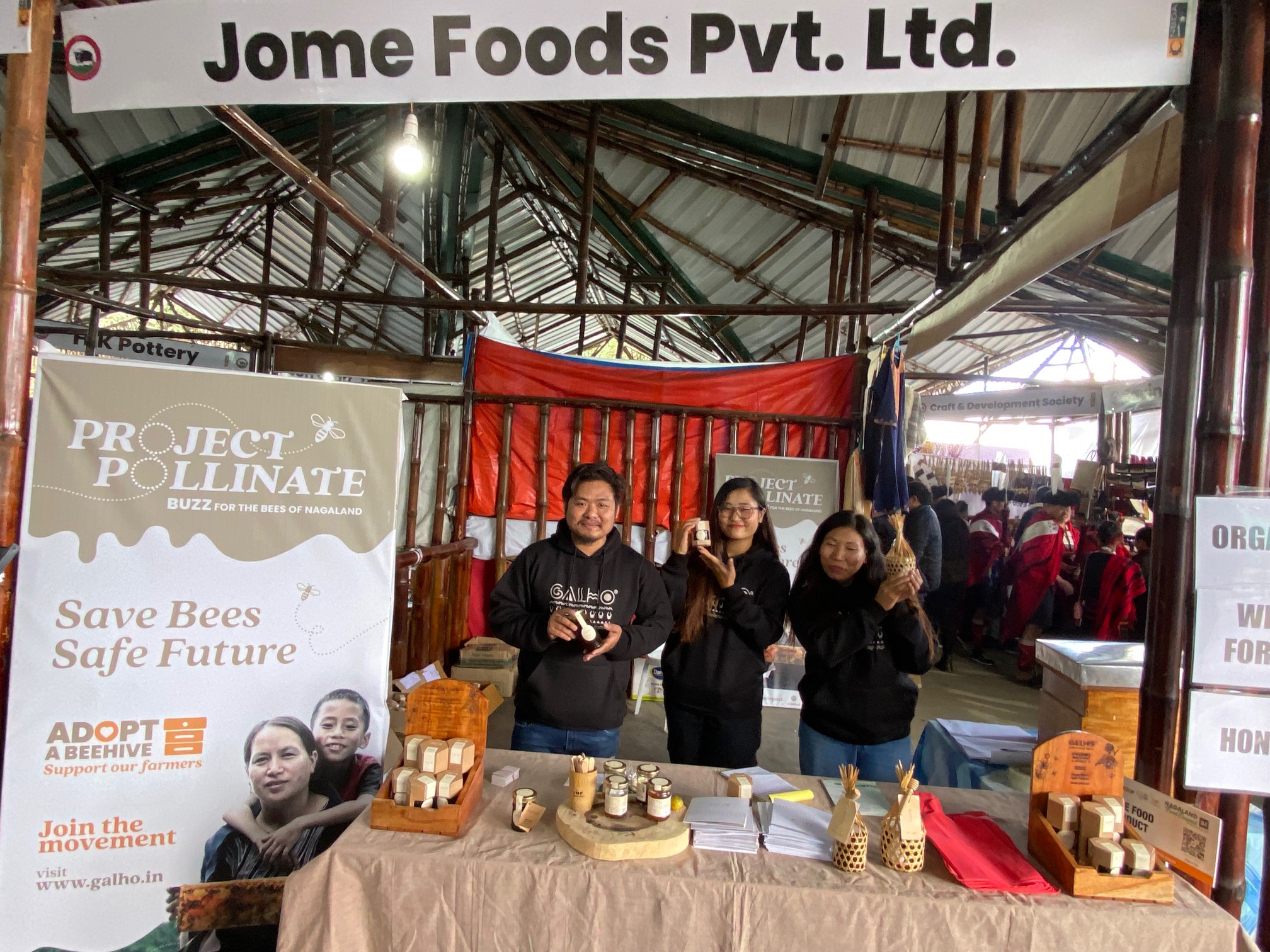Medoneizo Putsure and Toshienla Jamir—founder and co-founder of JOME Foods Private Limited—established the company in 2021 in Chümoukedima with a shared passion for sustainable beekeeping and premium honey.
Share

DIMAPUR — Medoneizo Putsure and Toshienla Jamir—founder and co-founder of JOME Foods Private Limited—established the company in 2021 in Chümoukedima with a shared passion for sustainable beekeeping and premium honey. Under their brand name, Galho, they specialise in authentic wild forest honey that is ethically sourced from Nagaland’s hills and forests.
With over 12 years of managing businesses and more than seven years of corporate experience at global companies like Royal Dutch Shell, Amazon, and NBC Universal, Medoneizo now leads the company as founder and CEO. A graduate of Ferguson College, Pune, where he majored in statistics, and holder of an MBA in Finance from the University of Wales, United Kingdom, he is also an Acumen fellow.
His entrepreneurial journey began in 2013 with the founding of Bambusa Express, which has since grown into a multichain QSR brand. Inspired by a dual purpose—to introduce the world to the experience of culinary delights from Northeast India and to address the critical issue of wood wastage—he established JOME Foods with a mission to create value for regional produce by building robust, sustainable ecosystems around the local supply chain.
His co-founder, Toshienla Jamir, also an MBA graduate from the University of Wales, brings over a decade of corporate experience. Having worked in consulting roles at Big Four firms, including PricewaterhouseCoopers, she honed her skills in strategic planning and business transformation. Her strategic insight and business acumen have been instrumental in shaping the company’s direction and driving its growth.
Among their signature offerings is stingless bee (Trigona) honey—a rare variety with a tangy-sweet taste and medicinal benefits. According to them, because it’s so special and carefully harvested, it’s perfect for those who love a little luxury with their wellness.
As they explain, choosing their honey means more than savouring its unique flavour: it means supporting rural families, preserving traditional knowledge, and helping save pollinators. It is, in their words, “a small choice that creates a big, positive impact—for people, bees, and the planet.”
In this interview with Eastern Mirror, the founders talk about the honey industry in India and their journey of building Galho, as well as the challenges and opportunities for aspiring beekeepers in Nagaland.
Can you give us a brief overview of the industry and what it involves?
India has a long history of honey production and consumption and currently holds the eighth position as the largest producer of honey globally. The Indian honey market size reached INR 27.0 billion in 2024 and is projected to reach around INR 50 billion by 2033. A large share of honey production is also exported, and the rise of health consciousness, digital shopping convenience, demand for natural products, and government initiatives to support apiculture are boosting the entire industry’s growth.
The industry focuses on honey production and includes other bee products such as beeswax, propolis, royal jelly, pollen, and bee venom, which are used in food, cosmetics, medicine, and wellness products. Globally and in India, there is growing awareness of pollinator decline and the need to conserve bee populations. In the last few years, the industry has gained momentum not just for being a high-value agri-business but also due to its positive impact on environmental sustainability, the crucial role bees play in pollination and biodiversity support, and social reasons.
Moreover, many technology companies are committed to modernising beekeeping by bringing innovation, efficiency, and transparency to every stage of the honey value chain. This will make the sector more sustainable and scalable for farmers, businesses, and governments.

Can you tell us about JOME Foods Private Limited?
We founded JOME Foods Private Limited in 2021, here in Chümoukedima, Nagaland. As a private limited micro-enterprise, our passion lies in sustainable beekeeping and crafting premium honey. Under our brand name, Galho, we specialise in authentic wild forest honey that is ethically sourced from Nagaland’s pristine hills and forests.
We’ve built JOME Foods not only to deliver unprocessed, high-quality honey but also to drive a model of social impact. We train and equip local beekeepers, many of them women, with scientific tools such as bee boxes. By doing so, we empower rural communities, conserve biodiversity, and promote environmentally friendly harvesting practices.
This journey has brought us recognition we are deeply humbled by, including the Acumen Angels Award (2024) for sustainable livelihood initiatives and the Hindu Kush Himalaya Innovation Challenge Award (2025) for advancing climate resilience and ethical beekeeping.
For us, Galho’s mission has always been about blending premium product craftsmanship with ecological responsibility and community empowerment.
What type of bees are commonly found in Nagaland, and which ones are best for honey production?
Nagaland has several species of bees. Apis Cerana is the ideal choice for sustainable beekeeping. It can be harvested at low cost and is a scalable choice for honey production in Nagaland. The honey is first-rate, genuine, traceable, and nutritionally richer than much of the commercially produced honey. Rock bees (Apis Dorsata or Apis Laboriosa) are wild and found on high cliffs in remote forest areas. Even though harvesting Rockbee honey is dangerous, it continues to be highly sought after for its wild origin, exceptional taste, and medicinal value.
Stingless Bees are a domesticated species and produce a unique type of honey known for its distinct sour flavour, unlike the sweet flavour of regular honey. Recent field studies have also proven that integrating stingless bees into farming systems significantly improves productivity and better-quality produce.
For students interested in honey production, what subjects or courses would be helpful to study?
Students interested in honey production should study apiculture, entomology, and botany to learn bee behaviour, hive management, and nectar sources. Courses in microbiology and food science help ensure the quality and safety of honey, while ecology and environmental studies promote sustainable practices. Adding agribusiness, entrepreneurship, and digital marketing equips students with the skills to effectively brand, package, and sell honey. Short workshops or food safety certifications can further enhance practical expertise for a successful career in beekeeping.

What skills, beyond academics, are important for someone who wants to become a beekeeper or honey entrepreneur?
Beyond academic knowledge, aspiring beekeepers or honey entrepreneurs need a blend of practical, interpersonal, and business skills. Patience and observation are vital, as bees are sensitive to environmental changes and require careful monitoring. Problem-solving and adaptability help in managing challenges like pests, diseases, or shifting weather patterns.
Good manual dexterity and attention to detail ensure safe hive handling and efficient honey extraction. Physical stamina is also important, as beekeeping can involve outdoor labour and lifting heavy hives. Strong communication and networking skills enable building relationships with suppliers, customers, and local communities, while marketing and branding abilities are essential for positioning honey products in competitive markets. Finally, basic financial management, including budgeting, pricing, and scaling production, supports long-term business sustainability. Together, these skills allow a beekeeper or honey entrepreneur to balance environmental stewardship, product quality, and profitable growth.
How can students learn beekeeping while still in school and college?
Students can start learning beekeeping while in school or college by joining local beekeeping clubs, agricultural extension programmes, or workshops that offer hands-on training. Many agricultural universities and NGOs provide short-term apiculture courses or internships where students can gain practical hive management experience during vacations. They can also volunteer with local beekeepers, watch educational videos, or participate in online courses and webinars to build foundational knowledge. Starting with a small hive or school project can give them practical exposure while balancing studies, helping them develop skills and confidence before pursuing beekeeping professionally.
What are the career options in beekeeping and honey-related industries?
Beekeeping and honey-related industries offer a wide range of career opportunities. You can become a professional beekeeper or apiary manager, focusing on honey and bee product production, or venture into entrepreneurship by creating value-added products like infused honey, skincare items, or health supplements. Careers in pollination services and agricultural consulting are in high demand, supporting crop production and ecosystem health.
There are also roles in research, product development, and quality assurance, as well as opportunities in marketing, branding, supply chain management, and export for those interested in the business side. Additionally, environmental conservation, education, and training offer meaningful paths for those passionate about sustainability and community development.

How can one start small in this field, perhaps with limited resources?
Starting small in beekeeping with limited resources is very achievable. Begin with one or two hives using affordable or second-hand equipment and focus on learning basic hive management through local workshops, online courses, or mentorship from experienced beekeepers. Choose a bee species suited to your region and start in a safe, pesticide-free area with good forage. Reinforce your skills gradually, reinvesting early profits into expanding hives or improving equipment. Keeping detailed records of hive health, harvests, and expenses helps build good habits from the start, while connecting with local beekeeping networks can provide guidance, market access, and support as your venture grows.
What are the main challenges that beekeepers in Nagaland face today?
Lack of access to science-backed beekeeping is a major challenge. Absence of strong market linkages and a structured value chain for honey products are major barriers to the sector’s growth. Without a proper value chain, processing, packaging, branding, and marketing remain obsolete.
What opportunities exist for exporting honey from Nagaland to other parts of India or abroad?
Nagaland’s honey industry holds a strong export potential thanks to its unique floral diversity, organic appeal, and reputation for premium quality. Within India, growing demand for natural, unprocessed honey in urban health-conscious markets presents opportunities to supply speciality stores, organic food retailers, and e-commerce platforms. On the international front, niche segments such as medicinal stingless bee honey, wild forest honey, and ethically harvested rock bee honey can attract buyers in countries that value rare, sustainably sourced products.
Key opportunities include tapping into GCC nations, Southeast Asia, and European markets, where interest in exotic and organic products is rising. However, success requires meeting strict quality standards, certifications (like FSSAI, APEDA, or organic labels), consistent supply, and robust branding. Collaborating with cooperatives, government export schemes, and trade fairs can further open doors, positioning Nagaland honey as a distinctive product in both domestic and global markets.

Are there government schemes or programmes that support young entrepreneurs in this field?
Yes. Young entrepreneurs in beekeeping can benefit from several government schemes. The National Beekeeping & Honey Mission, Nagaland Beekeeping & Honey Mission, provides training, resources, and financial support for setting up hives and equipment. Programs like Stand-Up India offer loans specifically for women and SC/ST entrepreneurs. At the same time, Gramodyog Vikas Yojana and MOVCD-NER provide subsidies for infrastructure, processing, and marketing, particularly for organic and other projects in the North East region. Additionally, the Atal Innovation Mission supports innovation and entrepreneurship through incubation centres. These schemes make it easier for students and young entrepreneurs to start and grow honey-related ventures with guidance, funding, and training.
What advice would you give a student who wants to start beekeeping as a side business?
For a student wanting to start beekeeping as a side business, start small and practical. Begin with one or two hives to learn hive management, bee behaviour, and honey harvesting without overwhelming your time or resources. Focus on hands-on training through workshops, internships, or volunteering with experienced beekeepers, and complement it with basic knowledge of botany, entomology, and food safety. By choosing a bee species suited to your region and ensuring a safe, pesticide-free location. Keeping detailed records of hive health, honey yield, and expenses, and gradually reinvesting profits to expand. Networking with local beekeeping associations or cooperatives can help with mentorship, market access, and support. Most importantly, balance your studies and beekeeping, treating it as a learning opportunity and slowly building skills for a sustainable side venture.

What role does technology play in your business?
Technology is a quiet hero in our honey story. From smart hive sensors that keep an eye on bee health to GPS tools that help us find the best flowering spots, tech makes sure our bees stay happy and productive. In our processing, modern equipment keeps every drop pure and safe, while e-commerce and social media let us share Nagaland’s finest honey with people everywhere. Even behind the scenes, digital tools help us track quality, manage orders, and stay connected with customers—making every jar a little smarter and a lot sweeter.
What makes your honey special for eco-conscious friends like you?
Our honey comes straight from Nagaland’s untouched forests, where happy bees collect nectar from wildflowers. It’s pure and chemical-free, and every jar helps protect nature and support local beekeepers. We team up with local beekeepers who use a gentle, sustainable harvesting method so the bees stay healthy and happy. Each jar is traceable from hive to table, so you know you’re getting authentic, premium honey every time.